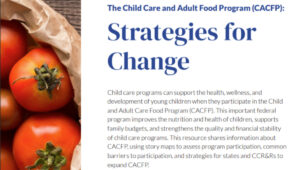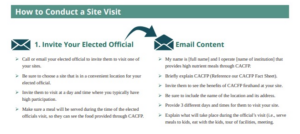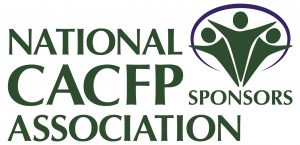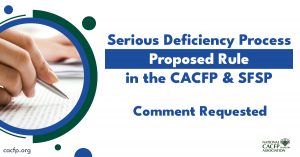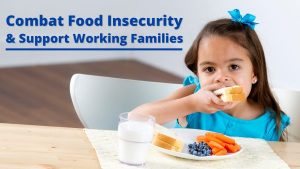Policy
CACFP Strategies for Change
Since 2019, Child Care Aware® of America (CCAoA) and Nemours Children’s Health have partnered to create geographic information system (GIS) technology story maps to visualize CACFP participation and highlight communities that could be considered for CACFP expansion.
Read MoreAdvocate for the CACFP: Host Your Elected Official
During the entire month of August, every congressional elected official will be back in their home state or district. Don’t miss this opportunity to advocate for CACFP! Showcasing your program is one of the most impactful ways to advocate for the CACFP.
Read MoreState Agency Financial Review Requirements
Child Nutrition Program Integrity Final Rule codified the requirement for an annual reconciliation of bank account activity and accounting of reported actual expenditures with Child and Adult Care Food Program (CACFP) payments. This memorandum provides a summary of each provision and instructions for how to complete the annual verification of bank account activity and actual expenditures.
Read MoreGeographic Preference Expansion Related to the Final Rule
This memorandum provides a detailed explanation of the expanded geographic preference option. CNP operators, State agencies purchasing for CNPs, and the USDA Department of Defense Fresh Fruit and Vegetable Program (USDA DoD Fresh) may use local as a specification and continue to set a geographic preference when soliciting or buying unprocessed agricultural products.
Read MoreNCA Response – Proposed Rule for the Serious Deficiency Process
In February 2024, USDA released the proposed rule Serious Deficiency Process in the CACFP and SFSP. After meeting with members and extensive research NCA has submitted our response to USDA stating our position on the proposed changes.
Read MoreAddressing Child Hunger When School is Out
While summer is a time for relaxation and vacation for some, it is a time of great uncertainty for many children who experience food insecurity. Afterschool and on the weekend, children are also unsure of where their meals will come from. That’s where Child Nutrition Programs step in.
Read MoreNCA Commends USDA Improvements to Child Nutrition Programs
Last month, USDA released a final rule to better align Child Nutrition Programs with the 2020-2025 DGAs. NCA is glad to see such positive changes made to Child Nutrition Programs and commends USDA for their leadership in improving program vital to child food security.
Read MoreComment Requested – Serious Deficiency Process in the CACFP & SFSP
USDA has requested comments on their proposed rule for the Serious Deficiency process for CACFP and SFSP. They need your feedback to help them determine what changes to make!
Read MoreFinal Rule: Updates to Meal Patterns in CACFP & SFSP
The USDA recently released a Final Rule that better aligns meal patterns in the CACFP, SFSP, and School Meals with the Dietary Guidelines for Americans.
Read MoreThe CACFP Combat Child Hunger and Supports Working Families
According to a USDA report, one in every five children in the United States is food insecure, meaning that approximately 13 million children do not know where their next meal will come from. The CACFP provides quality meals to many of these children and helps working families protect their children against hunger. Read more about how CACFP contributes to food security.
Read More
